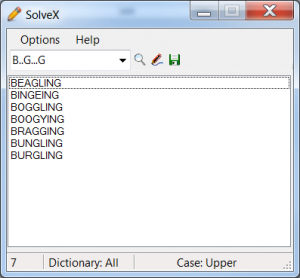I have been dabbling with Android development on and off for a little while now.
Android apps are usually written in Java, and having never used Java before, I have had to teach myself the basics of Java.
 I wanted to start with a very basic app so I decided to convert an existing app that I had written in C# to run on Android.
I wanted to start with a very basic app so I decided to convert an existing app that I had written in C# to run on Android.
The app is SolveX and I have written it to help me when I get stuck with a crossword, which seems to happen all the time. It uses SQL to find matches for the words I am stuck on. Having a database of over 105,000 words it usually manages to find the right word.
I have used this app on a personal basis for some time now although I had not released it on my website. I have taken this opportunity to tidy it up, seperating the presentation from the logic by dividing it into seperate classes, and it is available now at my website.
The conversion to Android went quite smoothly, after I had converted the database to use SQLite, as used by Android.
 The only issue that I had was how to deploy the database, which was a file of over 3Mb. I eventually decided to store the database on a web server and deploy the app without the database. When the app is used for the first time it connects to the web server and copies the database to the user’s device. This only needs to be done on the first occasion the app is used.
The only issue that I had was how to deploy the database, which was a file of over 3Mb. I eventually decided to store the database on a web server and deploy the app without the database. When the app is used for the first time it connects to the web server and copies the database to the user’s device. This only needs to be done on the first occasion the app is used.
The app is now available at the Android market with a download size of 34k.